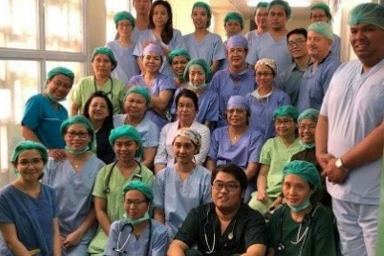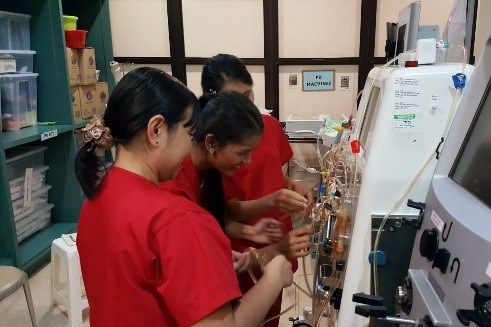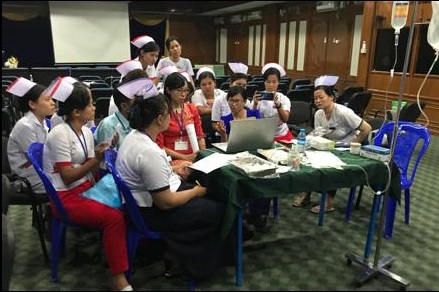Dating back more than a decade when the first Myanmar renal fellow Dr Khin Moh Moh was trained in Singapore, the Sister Renal Centre (SRC) project is a collaboration between Singapore and Myanmar which has trained 11 out of the 12 paediatric nephrologists in Myanmar over the last decade through fellowships sponsored by the International Paediatric Nephrology Association (IPNA) and the Mentoring Centre (MC) team, an experienced training centre, from Singapore.
Through the close contact between the Supporting Centre (SC) team, an experienced training centre usually from a high-income country, and the returning nephrologists, there has been frequent referral of cases and email discussions of difficult cases experienced in Myanmar. Because of the close communication, the practice of paediatric nephrology across Myanmar is seen as an extension of the practice in Singapore. The nephrologists who returned to Myanmar after their training have instituted care pathways and work processes adapted from those they have seen in Singapore. They also use the same treatment protocols and have adopted and translated many patient education materials into their local language.
The two major centres for paediatric nephrology in Myanmar are the Yangon Children's Hospital and the 550-bedded Children's Hospital in Mandalay, with most of the trained paediatric nephrologists based in these two hospitals. The two hospitals currently provide paediatric chronic haemodialysis and peritoneal dialysis.

The SC team has identified the following areas in Myanmar which MC can help in Level B.
Stages
| Description |
|---|
Level C
| The first stage within the program. Sister partnerships jointly enter the program for a period of two years. They receive funds from International Society of Nephrology (ISN) to help develop and support training links.
|
Level B
| The second stage when the sister centres have shown significant progress in level C and can move to level B after 2 years.
|
Level A
| The final stage. Level B centres can apply for an upgrade to level A after 2 years and these upgrades are reserved for those few partnerships whose emerging sister centres show the most promising development towards centres of excellence in their region.
|
- There were no transplant options for the chronic dialysis children. The country has never performed a paediatric renal transplant. As a result, almost all their chronic dialysis children stay in the hospital for years as their hometowns are too far for them to travel three times a week for treatment.
- The management of pre-dialysis chronic kidney disease stages 3-5 are not optimal. Doctors in the community know little about the early diagnosis and management of childhood kidney disease. Because of this, affected children are not referred early to the hospitals. Antenatal diagnosis of congenital anomalies of kidney and urinary tract are not ideal due to the lack of knowledge and diagnostic facilities among the obstetricians, neonatologists and radiologists. These babies are then left undiagnosed. In cases like urinary obstruction, high grade vesicoureteric reflux, posterior urethral valves, lack of prompt interventions can lead to poor long-term outcomes in terms of renal function.
- Lack of training for the renal nurses. Unlike the doctors, the dialysis nurses have not received overseas training. Their roles are limited to performing dialysis and patient education. They can be trained to take up more active roles like creating new patient training materials, training new nurses, setting up new work processes, creating and maintaining databases for centre audit.
Achievements in Level B
The last four years as SRC partners have been very fulfilling for both the emerging centres (EC), a centre from a low-resource country in need of training, and the MC. Our achievements in Level B are summarised into four parts:
- Completed the country's first seven paediatric renal transplantations in Myanmar, as part of the quest to set up a new sustainable renal transplant programme in the two ECs
- Improving paediatric specialist nursing standards (especially in dialysis and transplant care)
- Continuing Medical Education in Paediatric Nephrology for both nurses and doctors in EC:
- Visits
- from MC to EC (Doctors)
- Weekly teleconferencing via GoToMeeting
- Improving clinical management of difficult cases in ECs through weekly Friday morning teleconferencing
- Clinical research
- Establishing a clinical local registry for chronic kidney disease (CKD)
- Genetics testing for childhood primary glomerular disease





















